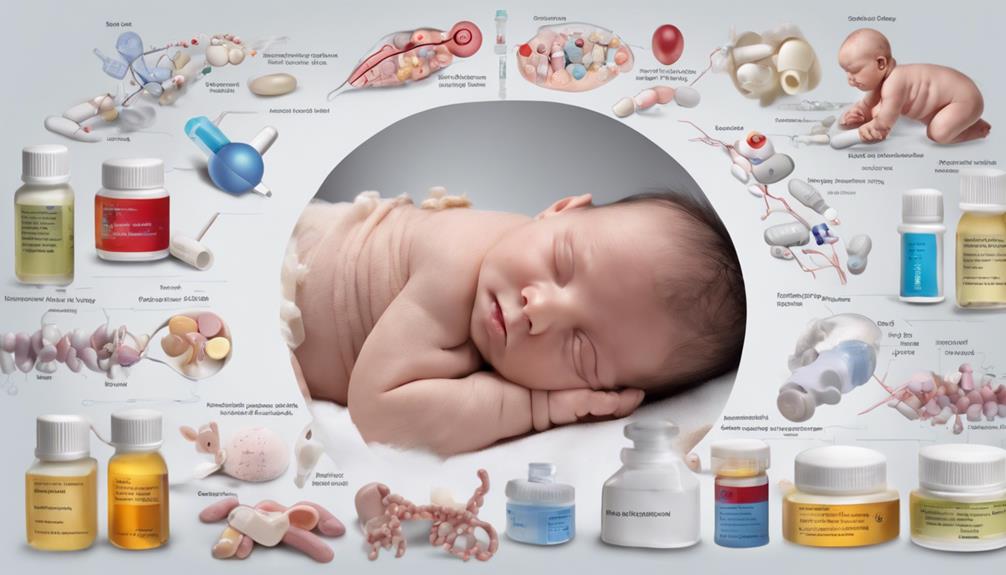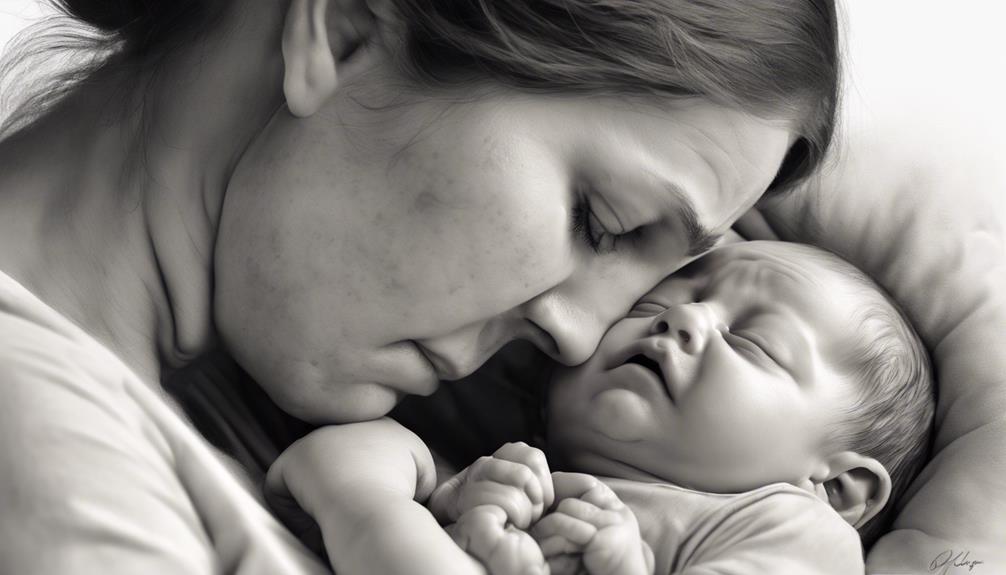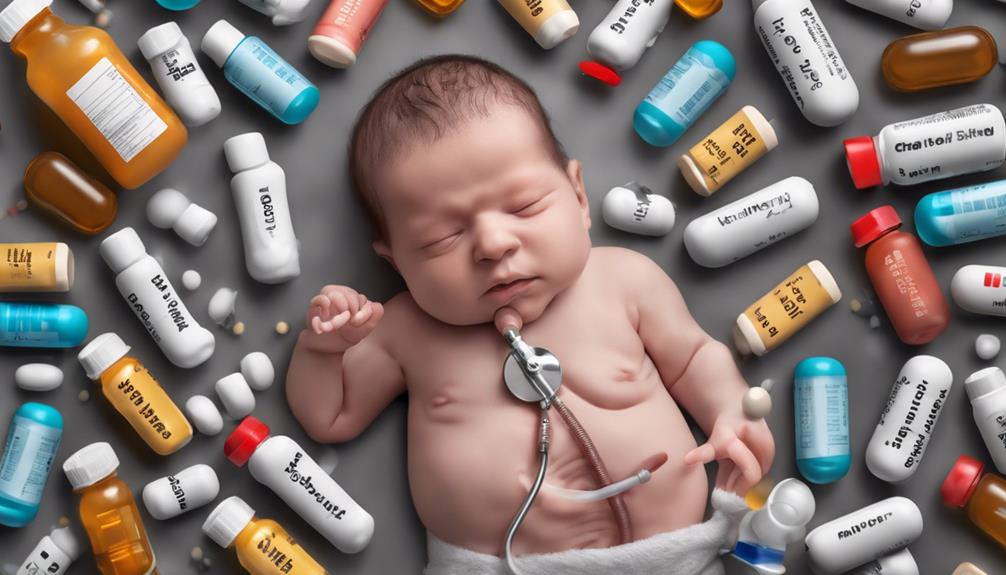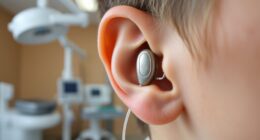When delving into the intricate world of infant health, it’s like navigating through a symphony with precision – where each note and harmony contributes to crafting the final masterpiece.
However, when antibiotics enter the scene, particularly aminoglycosides, a discordant element emerges that can disrupt this delicate balance.
The repercussions of this disruption on newborns' hearing may surprise you. Understanding how antibiotics cause hearing loss in infants is not just a matter of knowledge but a vital step in safeguarding the well-being of our little ones.
Key Takeaways
- Aminoglycosides like gentamicin increase hearing loss risk in NICU newborns.
- Early antibiotic exposure in NICU infants impacts hearing health significantly.
- Vigilant monitoring during antibiotic use is crucial for detecting hearing impairment.
- Genetic testing and personalized treatment plans can reduce antibiotic-induced hearing risks.
Antibiotics and Aminoglycosides Hearing Risk
Aminoglycoside antibiotics, such as kanamycin, gentamicin, and neomycin, pose a heightened risk of hearing loss in newborns, particularly those in the NICU. It's a concerning reality that NICU infants have an 80% chance of being administered aminoglycosides, putting around 480,000 babies at risk of hearing impairment each year. The rate of hearing loss in NICU babies due to aminoglycoside use is significantly higher, ranging between 2-4%, compared to full-term infants.
Infections can further compound the risk of hearing impairment when using aminoglycosides, underscoring the critical importance of diligent monitoring and cautious administration. The impact of hearing loss on newborns exposed to aminoglycosides in NICUs can be profound, affecting their educational and psychosocial development in the long run. Therefore, meticulous attention to the administration of these antibiotics, especially in the vulnerable NICU population, is essential to mitigate the risk of irreversible hearing damage in these delicate infants.
Other Antimicrobials and Hearing Loss

When considering the broader spectrum of antimicrobials, it becomes evident that additional antibiotics and antimicrobials, including azithromycin, clarithromycin, minocycline, and ketoconazole, have also been associated with the risk of hearing loss.
Azithromycin (Zithromax) and clarithromycin (Biaxin) have been linked to hearing impairment, while minocycline (Minocin) and ketoconazole (Nizoral) are among the antimicrobials that may contribute to this issue. It's important to note that ritonavir (Norvir), commonly used in HIV treatment, is also associated with potential ototoxic effects.
Moreover, aminoglycosides like kanamycin, amikacin, gentamicin, neomycin, and paromomycin are well-known for causing hearing loss. In the context of NICU infants, who are already at a heightened risk of hearing impairment, approximately 80% receive aminoglycosides, leading to a hearing loss rate ranging from 2-4%.
Understanding the potential ototoxic effects of these antimicrobials is crucial in managing the care of vulnerable newborns.
Antibiotics in the NICU and Hearing
In the neonatal intensive care unit (NICU), the administration of antibiotics plays a critical role in the treatment of infections while also posing potential risks to newborns' hearing health.
Here are some key points to consider:
- Approximately 80% of infants in NICUs in the U.S. receive aminoglycosides, increasing their risk of hearing loss due to the toxic effects on the inner ear.
- The rate of hearing loss in NICU graduates is 2-4%, significantly higher than in full-term births, highlighting the impact of early exposure to antibiotics on hearing health.
- Inflammation from infections can exacerbate the risk of hearing impairment when using aminoglycosides, emphasizing the importance of monitoring infants for signs of hearing loss.
Being aware of these risks and closely monitoring infants in the NICU for any signs of hearing loss is crucial in mitigating the long-term consequences on their quality of life and development.
Suspecting Hearing Loss in Newborns

Navigating the delicate realm of newborn health, one of the key considerations for caregivers is recognizing the signs that may indicate hearing loss in infants. Observing responses such as startles, vocalizations, or turning towards noises can provide early clues.
Newborn hearing screening tests are crucial as they can detect potential issues before leaving the hospital. Signs of hearing loss in neonates may manifest as a lack of response to voices, failure to startle at loud noises, or delayed speech development.
Risk factors, including genetic predisposition, infections during pregnancy, and birth complications, heighten the need for vigilance. Early intervention is paramount for optimal language development, often involving specialized diagnostic testing.
Caregivers play a pivotal role in advocating for their newborns' auditory health, ensuring that any concerns regarding potential hearing loss are promptly addressed by healthcare professionals.
Mitigating Antibiotic-Related Hearing Risks
Mitigating the risks of antibiotic-related hearing loss in newborns requires proactive screening and personalized preventive strategies due to the potential ototoxic effects of commonly used aminoglycosides. Screening high-risk newborns, especially those in neonatal intensive care units (NICUs) or with genetic vulnerabilities, is crucial in identifying those susceptible to antibiotic-induced hearing impairment.
To address this issue effectively, the following steps should be considered:
- Genetic Testing: Implementing rapid genetic tests can identify infants with a genetic predisposition to aminoglycoside-induced hearing loss, allowing for personalized treatment plans tailored to their specific needs.
- Preventive Measures: Developing preventive measures, such as alternative antibiotic options or dosage adjustments based on genetic susceptibility, can help reduce the risk of hearing impairment in high-risk infants.
- Collaboration with Universities: Partnering with universities for research on innovative preventive strategies and treatment options can enhance the understanding and management of antibiotic-related hearing risks in newborns.
Frequently Asked Questions
Can Antibiotics Cause Hearing Loss in Newborns?
Yes, antibiotics can cause hearing loss in newborns. It's a concerning issue, especially when aminoglycosides are involved. Around 80% of NICU infants receive these antibiotics, increasing their risk.
Infections can make things worse. The rate of hearing loss in NICU graduates is 2-4%, much higher than in full-term babies. Long-term effects on hearing health are possible from aminoglycoside exposure.
It's crucial to monitor and address this risk early.
Can Antibiotics Cause Sudden Hearing Loss?
Absolutely, antibiotics can indeed cause sudden hearing loss. It's crucial to be aware of this potential side effect, especially for vulnerable populations like newborns.
Monitoring for any signs of hearing loss and identifying susceptibility early on can make a significant difference in preventing irreversible damage. Awareness and vigilance are key in safeguarding against antibiotic-induced hearing loss, particularly in those at higher risk, such as newborns in NICUs.
What Causes Hearing Loss in Newborn?
When newborns experience hearing loss, it can stem from various factors like genetic mutations or exposure to aminoglycoside antibiotics in intensive care settings. These antibiotics, while crucial for treatment, can pose risks to a newborn's hearing health.
It's essential to understand these links and the potential long-term impacts on a baby's ability to hear. Enhancing guidelines for antibiotic use in neonates may help mitigate these risks and safeguard their hearing.
What Would Cause a Baby to Be Born Deaf?
Sometimes, genetic mutations can predispose newborns to deafness. Certain babies, around 1 in 500, may have an increased vulnerability at birth.
Additionally, factors like exposure to aminoglycoside antibiotics in neonatal care can lead to permanent hearing loss in susceptible infants.
Understanding these risks and considering early genetic screening can be crucial in preventing deafness in newborns.
Conclusion
In conclusion, it's essential to be mindful of the potential impact antibiotics can have on newborns' hearing. By understanding the risks associated with aminoglycosides and staying vigilant for signs of hearing loss, we can protect our little ones from unnecessary harm.
Just like a gentle breeze that whispers warnings, let's tread carefully when it comes to antibiotic use in newborns to ensure their precious hearing remains intact.










